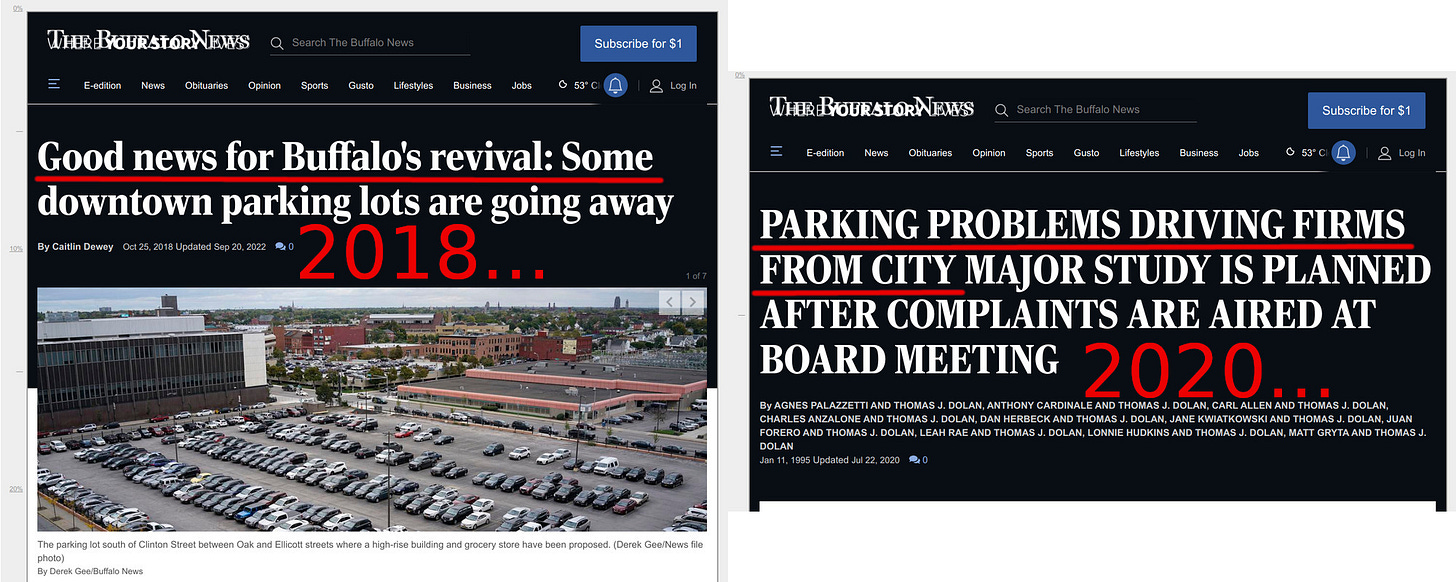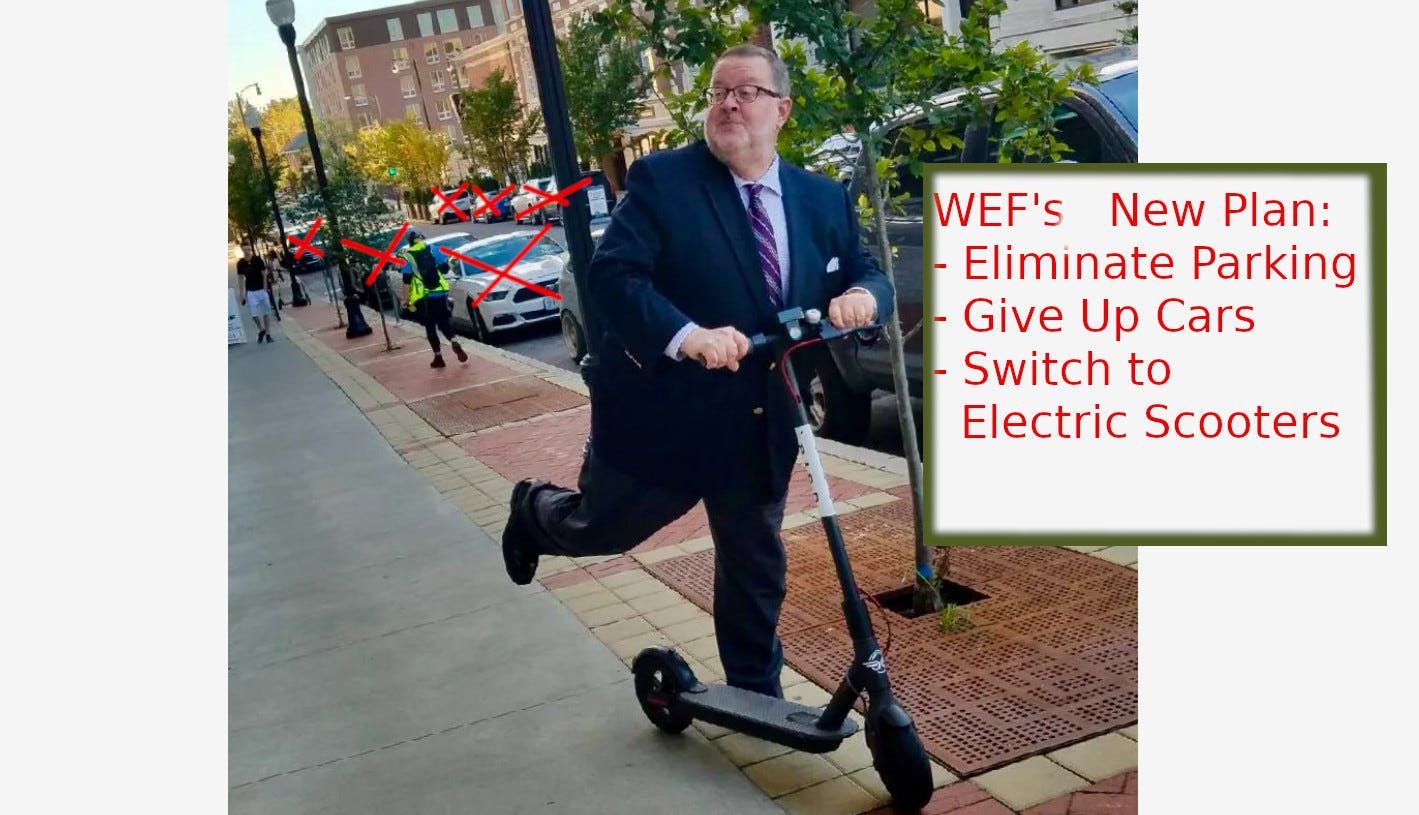Have you ever been to a densely populated, unfamiliar city and struggled to find a parking spot? It happened to me today when I visited a nearby college town for a “Mom’s weekend” when parents of all college students descended there. Parking was so hard to find!
If the World Economic Forum gets its way, you will have trouble finding parking every day, everywhere! This article is incidentally from today as well:

It turns out that the WEF has found a new enemy: parking spaces. You see, parking spaces slow down climate progress and “hold back urban mobility.”
While it is hard for me to understand why convenient parking holds back urban mobility (defined as being able to move from place to place easily), the WEF thinks otherwise:
The challenge: In many cities, on-street parking is either underpriced, or there’s an over-abundance of off-street parking. On average, parking takes up around a third of city land mass and with around eight spots for every car. Spaces optimized for cars reduce the ability for cities to accommodate other types of transit, or solutions such as bike sharing or scooter sharing docking stations or vehicle charging stations, says Shin-pei Tsay, Global Head of Cities and Transportation Policy, Uber Technologies.
As some of you may not immediately pick up the WEF’s coded language, the above means that they think that parking should cost more and that there should be fewer parking spaces.
I am unsurprised that Ms. Shin-pei Tsay, an Uber executive who is a WEF member, hopes to make parking more difficult for us. Uber would make more money if city dwellers could not find convenient parking. Shin-pei Tsay is a known long-time enemy of car parking spaces:
The WEF goes even further than Ms. Shin-pei Tsay and says:
“Authorities could even do away entirely with the necessity to build parking spaces (!!! - I.C.). This has been tried in Buffalo, New York, and where the government abolished any kind of parking regulation for developers. Developers built 25% less parking.”
What is interesting is that Buffalo’s experience eliminating parking has not been a happy one:
Let Them Eat Cake! (Drive Electric Scooters)
“Let them eat cake” is the most famous quote falsely attributed to Marie-Antoinette, the Queen of France during the French Revolution.
Similarly to Marie-Antoinette, the WEF thinks that if you cannot find parking, you would ride electric scooters instead:
Shared mobility — such as ride-sharing services and e-scooters — could be key tools in the pursuit of net-zero emissions in our cities.
But can everyone ride a scooter or afford to order numerous daily Uber rides?
About 40% of my readers are retired (my impression from your comments). I am sure some of us may find riding scooters daunting. I am recovering from a broken foot, and a scooter is the last thing I would set my foot on. At the same time, the same people who have mobility problems (due to age or disability) would be the people who also have limited finances and have a hard time affording endless Uber rides.
Imagine going to a store to buy food and clothes. How useful will a scooter be to carry your purchases back home?
Even young people get hurt riding electric scooters. I know a young man in good shape who sprained his wrist due to a scooter pothole mishap.
How will scooters work out during rain, sleet, or snow? These pictures may give you some ideas:
Occasionally, we may need to hop into a car and drive to a hospital for minor medical emergencies. I had to do this several times for my family members in the last few years. How long will you wait for Uber to pick you up when you or your loved one is sick?
Lastly, as my readers pointed out, what about pregnant women or mothers with small children?
I Lived in a “15-Minute City” With No Cars - for 23 Years! I Do Not Want to Go Back
I recently realized that “15-minute cities” are not new. I lived in a 15-minute city where almost nobody had a car. In Moscow, Russia, where I lived for 23 years before emigrating to the United States in 1994, I used public transportation and walked to stores and school instead of driving. I had no other choice.
People lived in small apartments due to the urban density needed to allow stores to be located within walking distance.
The upside is that almost everyone was thin there, although people were far from healthy for many reasons.
The downside is that it was majorly inconvenient and limiting compared to my life in the USA, as I discovered after I moved.
They Wanted You to Buy an Electric Car. Now They Want You to Have No Car
For a long time, the talk from our climate authorities was that, to save the planet, we need to transition to electric cars. Having realized that the electric car transition is impossible, the WEF wants us to have no cars.
Artificially engineered shortage of parking is a tool they want to use to goad us into abandoning cars and jumping onto scooters.
So, the next time you are having problems finding a parking spot, consider that your problems may, in part, be caused by intentional and new urban design trends meant to inconvenience us into adopting less comfortable and less safe choices like electric scooters.
How long will it be before THIS guy ends up with a broken chin?
When discussing secret plots, we usually think about scary and demonic stuff, such as the depopulation conspiracy.
The WEF’s plans to eliminate parking spaces do not quite rise to that diabolical level. Still, they demonstrate the insanity of their plans and a disregard for regular citizens’ safety and convenience. I am sure Bill Gates, Klaus Schwab, and other WEF leaders will not be personally frustrated by a shortage of parking spots - but they are engineering such a shortage for you and me.
Are you able to ride an electric scooter every day?
What do you think?









Hey.. maybe they should come to ND where it’s -40 some days in the winter. I won’t be riding a bike or a scooter anywhere here. Or taking a bus to Costco. We’re being ruled by fools.
The "A" answer is to avoid urban areas like the plague, if at all possible. I haven't been to Seattle for several years, and I live less than an hour away. Any area pushing WEF policies isn't a place to support.